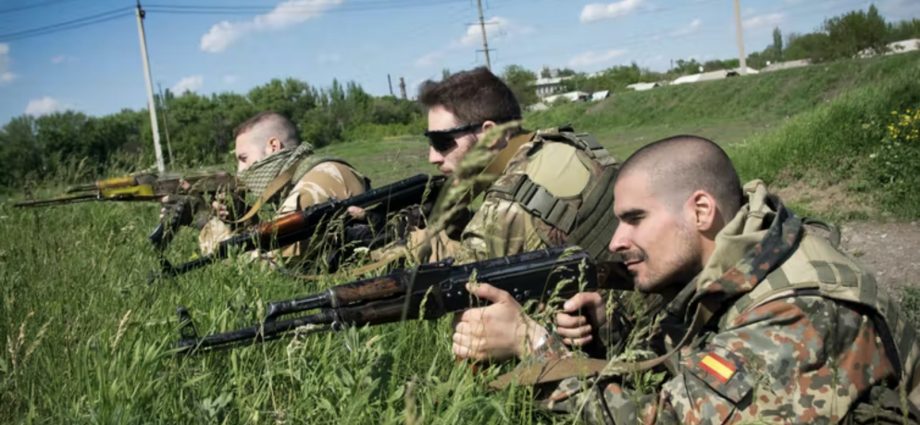
When Syrian mercenaries first began appearing a few years ago in other conflicts, such as in Libya and Azerbaijan, analysts wondered whether the fighters might eventually make their way to Ukraine. By contrast, few have paid attention to what role foreign fighters in Syria, particularly jihadists, might eventually play in Europe.
That tunnel vision helps explain why the recent departure of Chechen fighters from Syria to fight against Russia in Ukraine came as a surprise to many. But in hindsight, such a development should have been expected because of the lull in combat in Syria, Hayat Tahrir al-Sham’s (HTS) hostility toward jihadist factions, and Ukraine’s welcoming attitude.
Chechens were among the first foreign volunteers to join the war against the Syrian government. The first Chechen faction was established in Syria in 2012, by Omar al-Shishani, an infamous Chechen commander who became Islamic State’s minister of war the year after.
In addition to joining groups like Islamic State (ISIS) and Jabhat al-Nusra, the predecessor of HTS, Chechen fighters formed their own groups. Chief among them is Junud al-Sham, which was led by Murad Margoshvili (more commonly known by his nom de guerre, Muslim al-Shishani), and Ajnad al-Kavkaz, headed by Abdul Hakim al-Shishani (whose real name is Rustam Azhiev).
The exact number of Chechen fighters in Syria is unclear; local sources told me that they now number just a few hundred but that at one point there were several thousand. But even with modest numbers, Chechen fighters in Syria gained a reputation as skilled, dedicated, and brave insurgents.
Yet despite their crucial role in fighting the regime of President Bashar al-Assad, Chechens no longer seem welcome in Syria’s northwest. The ceasefire brokered by Turkey and Russia in March 2020 has turned independent foreign fighters in rebel-held areas from an asset into a threat or even a liability.
HTS, the region’s de facto rulers, are driving Chechens out. To consolidate its control over the last remaining rebel-held region, HTS has for years been systematically co-opting armed factions in its territories and eliminating those who resist. The group initially targeted rival factions, such as Ahrar al-Sham, but then moved to target any group that wouldn’t bend its knee.
Some organizations, including Ajnad al-Kavkaz, took the easy way out and suspended operations early, while others, like Junud al-Sham, initially resisted and only submitted when the threat of direct confrontation with HTS became imminent. Either way, Chechen fighters weren’t allowed to fight against Russia – the reason they moved to Syria in the first place.
Several conditions made the Ukrainian war an attractive alternative for Chechen fighters.
For starters, Ukraine allows Chechens to engage Russians directly. Indeed, Chechens’ desire to fight Russia is more compelling than the religious and ideological differences they have with the Ukrainian government. The historical grievances of dispossession and suppression by Russia have made resisting Moscow a top priority – wherever the fight might be.
Second, Ukraine’s welcoming attitude toward foreign fighters has made relocation easy. Unlike in 2014, when Russia forcibly annexed Crimea, Ukrainian authorities now are more willing to cooperate with foreign volunteers, and that includes battle-hardened Chechens with experience fighting Russian forces on hot front lines or in enemy territory.
Finally, according to Abdul Hakim Shishani, the Ukrainian authorities consider Chechens allies and allow them to stay legally. The Chechen fighters have even signed a deal with the Ukrainian government to create an all-Chechen brigade reporting directly to the Ministry of Defense.
The presence of Chechen fighters in Ukraine has facilitated access to the country for other Chechens. That was evident in Abdul Hakim’s experience; he was able to travel from Turkey with the help of Chechen contacts already on the ground. To increase their capacity further, Chechen brigades are reportedly working to persuade Ukrainian authorities to ease entry for their countrymen from Syria and Turkey, among other places.
The influx of Chechen fighters to Ukraine will likely encourage other regional jihadist groups in Syria to follow suit.
While the participation of those skilled fighters in the war might be useful for Ukraine now, Kiev’s welcoming attitude won’t last forever. This is especially true if foreign soldiers tip the balance of power in Ukraine’s favor. Eventually, the presence of foreign fighters will pose its own security challenges.
But the end of war in Ukraine won’t be the end of Chechens’ mission. As the Syrian case demonstrates, Chechen fighters’ decision to stand with Kiev has shown their willingness to align themselves with almost any party – as long as Russia is the common enemy.
This article was provided by Syndication Bureau, which holds copyright.
Follow this writer on Twitter @HaidHaid22.

